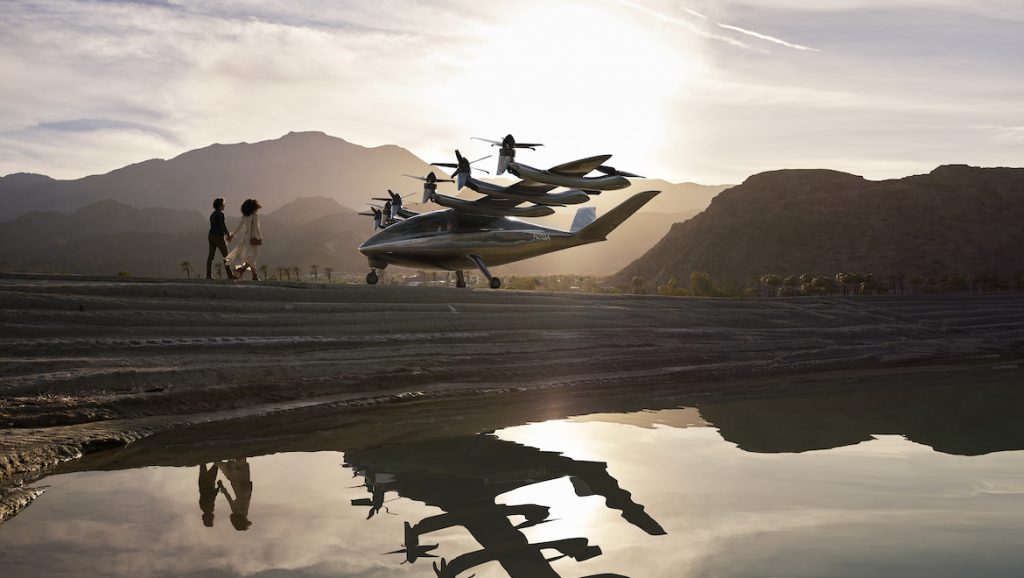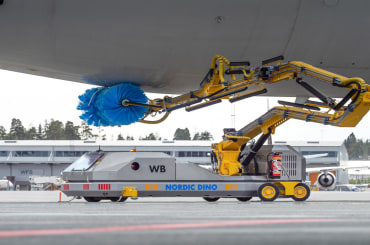
California-based start-up Archer Aviation has unveiled its newest ‘air taxi’ named Maker, a demonstrator version of its future full-sized electric vertical take-off and landing (eVTOL) aircraft.
Maker was unveiled at a hybrid live and live-streamed event in Los Angeles on Thursday evening, and included an XR digitally immersive simulation of what the experience of flying in an Archer eVTOL would look like.
Maker is a battery-powered, two-seat autonomous eVTOL aircraft. It boasts ‘tilt-rotors’ atop its cabin in order to take off and land like a helicopter, and propel forward like an aircraft,
The prototype can fly at speeds up to 240km/h at 2,000 feet, and has a range of up to 52 nautical miles.
It uses six separate battery packs to power its 12 electric motors, and is ultimately 100 times quieter than a traditional helicopter at altitude, at just 45 decibels, according to Maker’s creators.
Like other eVTOLs and air taxis, Maker’s eventual four-seater piloted successor will serve to transport people between cities and airports, or other popular short-haul transit routes, in lieu of taxis and public transport.
Production of Maker’s larger, four-seat successor is due to begin in 2022, with the first deliveries pencilled in for 2024, according to Archer.
Archer’s head of certification, Eric Wright, said that the autonomous Maker demonstrator model is a testbed for the eventual product, which will help Archer to get certification from the US Federal Aviation Administration prior to its market launch, a process that is already underway.
“The [two-seater] Maker aircraft is a stepping stone in the path to certification,” Wright said in an interview with TechCrunch.
“[It’s] a testbed that really helps us to increase our knowledge and awareness on say, the flight control systems and the electric propulsion and the things that we’re putting into the certified aircraft, and to help the FAA gain confidence in that design as we put it through its paces, and of course, they will be involved in watching that development occur.”
According to Archer’s co-founder and co-CEO Brett Adcock, the company’s full-scale air taxis are due to launch first in Los Angeles and Miami, due to the notorious traffic congestion that permeates both those cities.
“Our real goal is to make a mass market transportation solution in and around cities,” Adcock said.
The company currently intends to charge passengers between US$3-4 per passenger mile, which could work out to be about $50 for the seven-minute trip between Manhattan and JFK Airport. This trip could regularly take up to 90 minutes via car or taxi.
Earlier this year, Archer secured a US$1 billion order from United Airlines, which also saw the two form a partnership for the continuing development of Archer’s Urban Air Mobility solutions.
The aircraft, to be delivered in 2024, would primarily be used to transport passengers between its major hubs, according to United.
“Working with United as an investor, a strategic partner, it’s synergistic,” Adcock told Forbes. “One plus one equals three with them. They’re helping us get to market better, bring resources in. It’s a great partnership.”
United is set to use its aviation expertise to help Archer with general operations, including pilot and crew training, maintenance, certification and airport site selection, while Archer will provide assistance to United through its advanced technology.
“We have an entire team here that does systems simulation. We have data internally that shows where everybody in a city is going at every point in time throughout the day. We know how to model the vehicles … how long it takes to charge, how long it can fly, how much maintenance,” Adcock said.












